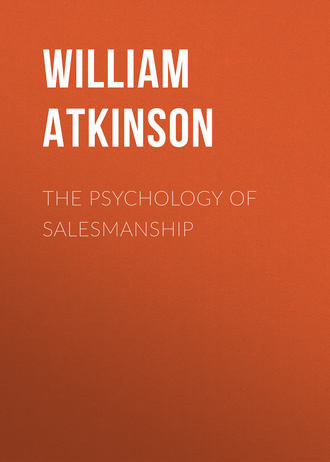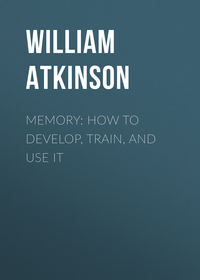 полная версия
полная версияThe Psychology of Salesmanship
We specially direct the student's attention to the above paragraph. It contains in a nutshell the whole philosophy of the introductory talk of the Approach. It is the essence of the experience and knowledge of the thousands of salesmen of the great selling organization of the large concern named, and is right to the point, and what is still more important, it is scientifically correct, and based upon true psychological principles.
The Salesman in making the Approach should not act as if he were in a hurry, nor should he dawdle. He should go about it in a business-like manner showing his realization of the value of time, and yet acting as if he had the time necessary for the transaction of that particular piece of business, just as he would if the buyer had called on him instead of vice versa. Don't swagger or strut, or act as if you were the proprietor. Act the part of the real business man who is at ease and yet is attending to business. Do not try to "rush" the customer in the Approach – you are calling on him and must appear to defer to him in the matter of opening the conversation, in a respectful and yet self-respecting manner. The better poised and balanced you are in manner, the more he will respect you, no matter how he may act. It is much easier for a buyer to turn down an ill-bred boorish caller than one who shows the signs of being a gentleman. In fact the boorish caller invites the turn-down – he suggests it by his manner; while the gentleman suggests respectful treatment. The line of least resistance in suggestion is the one most natural for people to follow.
Some salesmen try to grasp the hand of the customer at the beginning. This is all right if the customer be a jovial "hale fellow, well met" kind of a man, but if he be reserved and dignified he will be apt to resent your pushing this attention upon him. The thing to do is to make him feel like shaking hands – this is an important point, which counts if gained. You can generally tell from his manner and expression whether to extend your hand. You must trust to your intuitions in "sizing up" your man. What has been said regarding the mind of the buyer will help you, and what data you have collected will also be of use, but at the last you must depend upon your own intuition to a considerable extent. Experience develops this intuitive faculty. Some salesmen thrust their cards into the hands of a prospect when they introduce themselves. This is poor psychology, for it serves to attract the prospect's attention to the card and away from the salesman. Introduce yourself verbally, simply and distinctly, and then get down to business.
If you see a man is busy with someone else, or with something in particular – wait for him. Don't break into his occupation, until he looks up and gives you the psychological signal to proceed. Never interrupt another salesman who may be talking to the prospect. This is not only a point in fair play and business courtesy, but is very good business policy in addition. When you begin your introductory talk, get right to the point, and don't beat around the bush as so many do. Get down to business – get over the agony of suspense – take the plunge. Remember always, that to the prospect your little story is not as stale or stereotyped as it may be to you – so put earnestness into it, and tell it just as if you were relating it for the first time to someone who had requested it from you. Maintain your interest, if you would arouse that of the prospect.
Never commit the folly of asking a prospect: "Are you busy?" or, "I fear you are busy, sir?" This is a very bad suggestion for the prospect, and makes it easy for him to say "Yes!" You mould bullets for him to fire at you. If he really is too busy to give you the proper attention, you may do well to tell him so, and then get out – but never suggest anything of this kind to him if you expect to proceed. It is akin to the doleful "You don't want to buy any matches, sir, do you?" of the forlorn vendors of small articles who float into offices at times. Never make it easy for a prospect to turn you down – or out. If he is going to do these things, make him work hard to do it. This might seem like needless advice, but many young salesmen commit this particular fault. Avoid the apologetic attitude and manner – you have nothing to apologize for. You are using up your time as much as the prospect's time – let it go at that. Never apologize for anything but a fault or mistake. Your call is not a fault or a mistake – unless you make it so by assuming it to be such. Some men would like to apologize for being alive, but they never make salesmen. Be careful what adverse suggestions you may put into the prospect's mind by this apologizing and "explaining" business. What's the use of this nonsense anyway – it never sold any goods, and never will. It is merely a sign of weakness and lack of nerve. Better stop it.
The trouble with these apologetic and explanatory fellows is that they do not thoroughly believe in the merit of their propositions. If they really believed as they should – if they had "sold themselves" – they would realize that the prospect needs their goods, and, that although he might not know it now, he is being done a favor by having his attention called to them. A Salesman has no need to apologize to a customer, unless he has need to apologize to himself – and if he is not right on the latter score he had better change his line and get something to sell that he is not ashamed of, or get out of the business altogether. No man ever feels ashamed of anything in which he thoroughly believes and appreciates.
The following advice from the National Cash Register people, is like everything else they say, very good: "Do not attempt to talk to a man who is not listening, who is writing a letter or occupying himself in any other way while you are talking. That's useless, and is a loss of self-respect and of his respect. If he cannot give you his attention, say to him: 'I see that you are busy. If you can give me your attention for a few minutes I shall be pleased; but I don't want to interrupt you, if you cannot spare the time, and I will call again.' Try to understand and feel thoroughly the distinction between confidence and familiarity. Never fail in respect either to yourself or to the man with whom you are talking. Never be familiar with him. Never put your hand on his shoulder or on his arm, nor take hold of his coat. Such things are repugnant to a gentleman – and you should assume that he is one. Never pound the desk or shake your finger at a prospect. Don't shout at him as if sound would take the place of sense. Don't advance at him and talk so excitedly under his nose that he will back away from you for fear of being run over, as if you were a trolley-car. I have seen a sales agent back a prospect half way across a room in this way. Don't compel a man to listen to you by loud or fast talking. Don't make him feel that he can't get a word in edgewise and has to listen until you are out of breath. This is not the sort of compulsion to make customers. But make him believe that you have something to say and will say it quickly. Put yourself in his place from the very start. Make him feel, not that you are trying to force your business upon him, but that you want to discuss how his business may be benefited by you."
One of the best salesmen this particular company ever had has passed down to the selling corps of that concern the following axiom: "If you do but one thing, in approaching a prospect, say, 'It will save you money,' seven times, and you have made a good Approach." And so say we. Concrete facts, stated in terse terms, are the essence of the opening talk and the life of the Approach.
What we have said so far has reference to the stage of First Impression, which followed the preliminary stage of Involuntary Attention which was caused by your presence. The purpose of the favorable First Impression is to make the way easy for the real process of selling which is to follow. The principle of First Impression rests upon the associated experience of the buyer, and its effect arises from suggestion. The hasty, general idea or impression of the Salesman's personality, which we call the First Impression, is almost unconscious on the part of the prospect, and is due largely to the suggestion of association. That is, the prospect has met other people manifesting certain characteristics, and has fallen into the habit of hasty generalization, or classification of people in accordance with certain traits of appearance, manner, etc. This is the operation of the psychological principle of the Association of Ideas, and may be influenced by what is known as the Suggestion of Association. The following quotation from the volume of this series entitled "Suggestion and Auto-Suggestion," will make clearer this principle:
"This form of Suggestion is one of the most common phases. It is found on all sides, and at all times. The mental law of association makes it very easy for us to associate certain things with certain other things, and we will find that when one of the things is recalled it will bring with it its associated impression. * * * We are apt to associate a well-dressed man, of commanding carriage, travelling in an expensive automobile, with the idea of wealth and influence. And, accordingly, when some adventurer of the 'J. Rufus Wallingford' type travels our way, clad in sumptuous apparel, with the air of an Astorbilt, and a $10,000 (hired) automobile, we hasten to place our money and valuables in his keeping, and esteem ourselves honored by having been accorded the privilege."
The Suggestion of Authority also plays its part in the First Impression, and in all the stages of sale in fact. This form of suggestion is described in the book just mentioned, as follows: "Let some person posing as an authority, or occupying a position of command, calmly state a fallacy with an air of wisdom and conviction, without any 'ifs' or 'buts,' and many otherwise careful people will accept the suggestion without question; and, unless they are afterward forced to analyze it by the light of reason they will let this seed find lodgement in their minds, to blossom and bear fruit thereafter. The explanation is that in such cases the person suspends the critical attention which is usually interposed by the attentive will, and allows the idea to enter his mental castle unchallenged, and to influence other ideas in the future. It is like a man assuming a lordly air and marching past the watchman at the gate of the mental fortress, where the ordinary visitor is challenged and severely scrutinized; his credentials examined; and the mark of approval placed upon him before he may enter. * * * The acceptance of such suggestions is akin to a person bolting a particle of food, instead of masticating it. As a rule we bolt many a bit of mental provender, owing to its stamp of real or pretended authority. And many persons understanding this phase of suggestion take advantage of it, and 'use it in their business' accordingly. The confidence-man, as well as the shrewd politician and the seller of neatly printed gold-mines, imposes himself upon the public by means of an air of authority, or by what is known in the parlance of the busy streets as 'putting up a good front.' Some men are all 'front,' and have nothing behind their authoritative air – but that authoritative air provides them with a living."
The suggestion of associated manner, appearance and air – the "good front," in fact – is the principal element in the favorable First Impression. The balance is a mixture of tact, diplomacy, common sense, and intuition. But remember this always: the best "front" is the real one – the one which is the reflection of the right Mental Attitude and Character – the "front" of the Gentleman. If you lack this, the nearer you can act it out, the better for yourself. But no imitation is as good as the genuine article. The true Gentleman is the scientific mixture of strength and courtesy – the manifestation of "the iron hand in the velvet glove." So much for the First Impression.
The mental stages of Curiosity and Associated Interest on the part of the buyer are also to be induced by the Salesman in the Approach. We have described these phases in the chapter entitled "The Psychology of the Purchase," this particular part of which should be re-read at this point. A few additional words on these points, however, will not be out of place here.
Regarding the phase of Curiosity, we would say that it will be well if you can manage the opening talk to the prospect so as to "keep him guessing a little," while still holding his Associated Interest. Curiosity whets a man's interest just as Worcestershire sauce whets his appetite. The key to the arousing of Curiosity is the idea of "something new;" a new idea; a new pattern, a new device, etc. The mind of the average man likes "something new" – even the old fogy likes something new in his old favorites, new bottles for his good old wine. The idea of newness and novelty tends to arouse a man's inquisitiveness and imagination. And if you can start these faculties working you have done well, for Associated Interest is closely allied thereto. When you get a prospect to the stage of asking questions, either verbally or mentally, you have the game well started.
Never make the mistake of asking the man if he "wants to buy so-and-so." Of course he doesn't at that stage, particularly if you ask him in that way. It is too easy for him to say No! It is almost as bad as that stock illustration of adverse suggestion: "You don't want to buy any so-and-so, do you mister?" which brings a ready "No!" from the average person. Nor do you want to say: "I have called to see if I cannot sell you so-and-so, to-day, Mr. X." Or, "Can I sell you some so-and-so, this morning, Mr. Z?" This form of arousing interest is based on erroneous psychological principles. Of course, the prospect doesn't want to buy or be sold at this stage of the game – the sale is the finishing stage. This plan is like cutting a log of wood with the butt-end of the axe – you are presenting the wrong end of the proposition. You can never arouse Curiosity or Associated Interest in this way. Forget the words "You buy" and "I sell" for the moment – in fact the less you use them at any stage the better it will be, for they are too unpleasantly suggestive of the opening of pocket-books to be agreeable to the prospect. There are excellent substitutes for these terms – terms which suggest profit, advantage, saving and pleasure to the mind of the buyer, rather than ideas of expenditure and "giving up." Try to suggest the incoming stream of money to your buyer – not the outgoing one. The reason is obvious, if you understand the laws of suggestion and psychology.
In short, let your appeal at this stage be entirely to the Self Interest, Pleasure, and Curiosity of the prospect. Try to get him warmed up, and his imagination working. If you can do this he will forget his other objects of attention, and will lay aside his armor of suggestive defence and his shield of instinctive resistance to one whom he thinks "wants to sell something" and open his pocket-book. This is the stage in which you must get in the sharp end of your psychological wedge. Here is where you need the keen edge of your axe – the butt-end may be reserved for the Decision and Closing.
As far as possible, do not ask questions to which the prospect can answer "No!" at this stage. Fence him off on this point, and dodge every sign of a forthcoming negative. But if he does get out a "No!" or two – do not hear him. Let his "No!" slip off like water from a duck's back – refuse to admit it to your consciousness – deny it mentally – refuse the evidence of your ears. This is no time for "Noes" – go right ahead, unconscious of the words. Keep on appealing to his Interest, in the phases of Curiosity and Associated Interest. Your aim here is to get the prospect to the stage of Consideration. This stage is indicated by his asking a question showing a desire to know the particulars of your proposition. The question may show but a shade of interest, but it marks a move in the game. It is the prospect's answering move to your opening. It is an important psychological moment in the game. The next move is yours!
And that move is on the plane of the Demonstration – for the stage of the approach has now been passed.
Before passing on to the consideration of the stage of Demonstration, we desire to call your attention to the following excellent advice regarding the matter of rebuffs which are so often met with in the stage of Approach. It is from the pen of W.C. Holman, and appeared in his magazine "Salesmanship." Mr. Holman says: "A crack-a-jack salesman will receive a rebuff as gracefully and easily and with as little damage to himself as a professional baseball player will take in a red-hot liner that a batter drives at him, and go right on playing the game as if nothing had happened. An amateur salesman will want to quit playing, or call the attention of the umpire to the malicious intent of the batter. A blow that would knock the ordinary man off his pins will do nothing more than to give a professional boxer a chance to show his agility and win applause. If you drop a plank on a cork in the water with a tremendous splash the cork will bob up as serenely as if nothing had happened, and lie quietly once more on the unruffled surface of the water. And so a clever salesman, when a smashing blow is aimed at him by a surly prospect, will merely sidestep gracefully and continue calmly with the prosecution of his purpose. * * * Self-control disarms all ill natured attacks."
CHAPTER IX
THE DEMONSTRATION
In the last chapter we left the Salesman at that stage of the Approach where the prospect manifests enough interest to ask a question or make an interrogative objection. This is an important psychological point or stage in the game, and here the Approach merges into the Demonstration on the part of the Salesman; and the stage of passive attention on the part of the prospect merges into that of active attention, discussion and Consideration. The moment that the prospect ceases to be a passive listener, and displays enough active interest to ask a question or make an interrogative objection, the great game of the sale is on in earnest. The Demonstration has begun.
This stage of the sale closely resembles a game of chess or checkers. The approach and preliminary talk of the Salesman is the first move in the game; the answer, question or objection of the prospect is the second move – then the real game or discussion is on. It is now "up to" the Salesman to make his second move, which is a reply move to that of the prospect. And this particular move is a highly important one in the great game of the sale. Like an important early move in checkers or chess the success or failure of the whole game may depend on it, so it is well to have this move mapped out as a part of your preliminary study.
Macbain truthfully says of the first remark of the prospect: "The customer is not going to commit himself in response to the first remark. He always holds considerable in reserve. An objection – either expressed or implied – can always be counted on. It may vary from a general 'busy' statement, or 'no interest in what is about to be submitted,' or it may be a specific statement – even heated, in fact – that the one approached has 'no time for the salesman or his house.'"
But, just as in chess or checkers there are certain "replies" indicated for every one of the first few opening moves, all of which are fully stated and explained in text books on these games, so in the great game of Salesmanship there are certain replies indicated for these preliminary moves on the part of the prospect. The large selling concerns have schools of instruction, personal or correspondence, in which the Salesman is furnished with the appropriate and logical answers to the objections and questions usually advanced by the prospect. It will be found that there are really but few moves of this kind in the game of the average prospects – they tend to say the same things under the same circumstances, and there is always an appropriate answer. The salesman will acquire many of these answers by experience, conversation with older salesmen, or by instruction from his sales-manager or the house. Each line has its own stock of objections, and its own stock of replies thereto.
There are two general classes of replies to objections, which apply to nearly every kind of proposition. The first is that of deftly catching the objection on your mental fencing-foil, allowing it to glance off, and at the same time getting a thrust on your opponent. President Patterson of the National Cash Register Company is credited with special cleverness in this kind of reply, and his salesmen are said to be instructed to listen carefully to the prospect's objection and then to turn it back on him by a remark based on the principle of: "Why, that's the very reason why you should," etc. In other words the objection should be twisted into an argument in favor of the proposition. In the hands of a master this form of reply is very effective, and often brings results by reason of its daring and unexpectedness. But it is not every one who has the skill to use it to advantage.
The second class of reply is based upon what is called indirect Resistance, which, by the way, is often the strongest form of resistance, and accomplishes its intended effect while avoiding the opposition and antagonism of Direct Resistance. Some writers on the subject have called this "Non-Resistance," obviously a misnomer for it is a form of resistance although subtly disguised. It is analogous to the tree that bends in order to avoid breaking under the blasts of the storm; of the flexible steel which bends to the pressure, instead of breaking as would iron; but both of which spring back into place immediately. It is generally very poor policy to directly oppose the prospect upon minor points – the main point is what you are after. And the main point is the order – the rest is immaterial and unimportant. Let us contrast Direct-Resistance and Indirect-Resistance, and see the points of each.
In Direct Resistance the minor objections of the prospect are met with the answer: "You are wrong there, Mr. X;" or, "You are entirely mistaken;" or, "You take the wrong view;" or, as we heard in one instance: "Your objection is ridiculous." The Direct Resistance is necessary in a few contingencies, or upon rare occasions, but it should be sparingly and cautiously used. It is a desperate remedy indicated only for desperate diseases. The Indirect Resistance expresses itself in answers of: "That is possibly true in some cases, but," etc.; or, "There is much truth in what you say, Mr. X, but," etc.; or, "As a general proposition that is probably correct, but," etc.; or, "I quite agree with you, Mr. X. that (etc.) but in this particular case I think an exception should be made," etc. The value of this form of resistance lies in the fact that it costs you nothing to allow the prospect to retain his own ideas and entertain his own prejudices, provided they do not interfere with the logic of your general argument, nor affect your main point, the order.
You are not a missionary or a pedagogue – you are just a Salesman and your business is to take orders. Let the old fellow keep his foolish ideas and intolerant prejudices, providing you can steer him straight to the ordering point. The active principle in Indirect Resistance is to get rid of his general objections in the easiest and shortest way, by allowing him to retain them, and concentrating your and his attention and interest upon the particular points of your proposition – the positive and material points of your particular case. Avoid disputes on non-essentials, generalities, and immaterial points. You are not striving for first prize in debate —you're after orders. Remember the legal principles of the "pertinent, relevant, and material" points, and side-track the "immaterial, irrelevant and impertinent" side-issues, even if you have to tacitly admit them in Indirect Resistance. Here it is in a nutshell: Sidetrack and Sidestep the Non-Essentials.
The Salesman has now reached the point in which the prospect is manifesting the psychological stage of Consideration – the stage in which he is willing to "look into" the matter, or rather into the subject or object of the proposition. This stage must not be confused with that of Deliberation, in which the prospect weighs the pros and cons of whether he should purchase. The two stages are quite different. The present stage – that of Consideration – is merely the phase of examination, investigation or inquiry into the matter, to see if there is really anything of real practical interest in it for himself. It is more than mere Associated Interest, for it has passed into the manifestation of interested investigation. In many cases the process never gets beyond this stage, particularly if the Salesman does not understand the psychology of the process. Many salesmen make the mistake of trying to make their closing talk at this point – but this is a mistake. The prospect must understand something about the details of the proposition, or the qualities and characteristics of the goods, before he uses his imagination or feels inclination to possess the thing. So here is where the work of explanation comes in.









